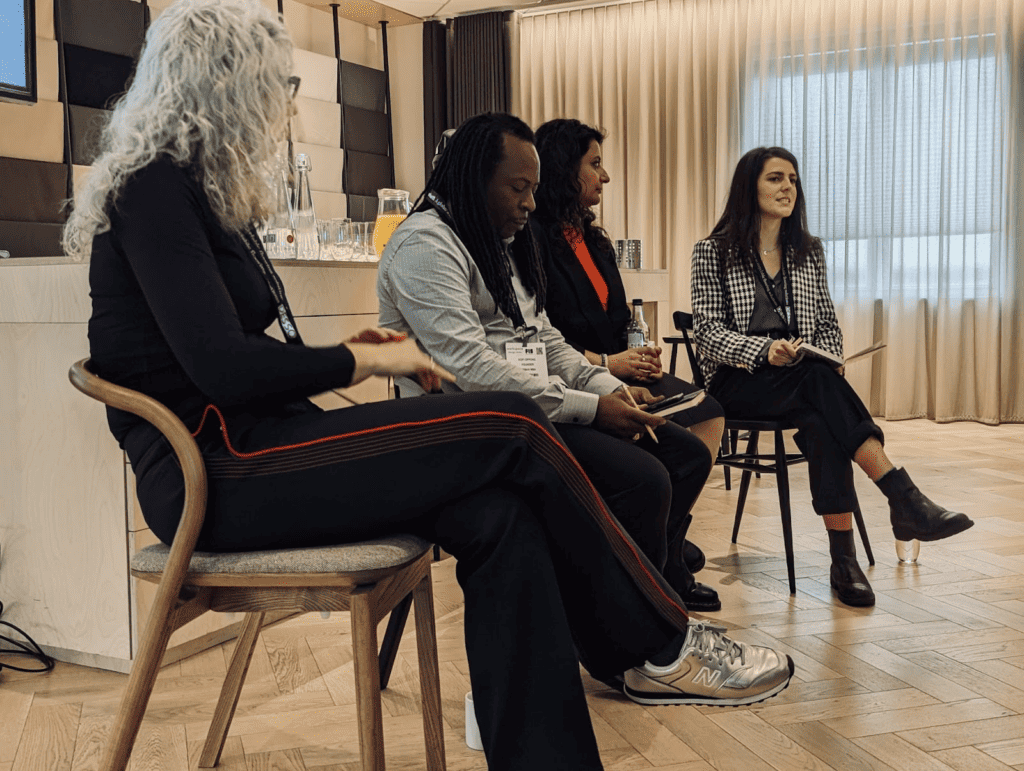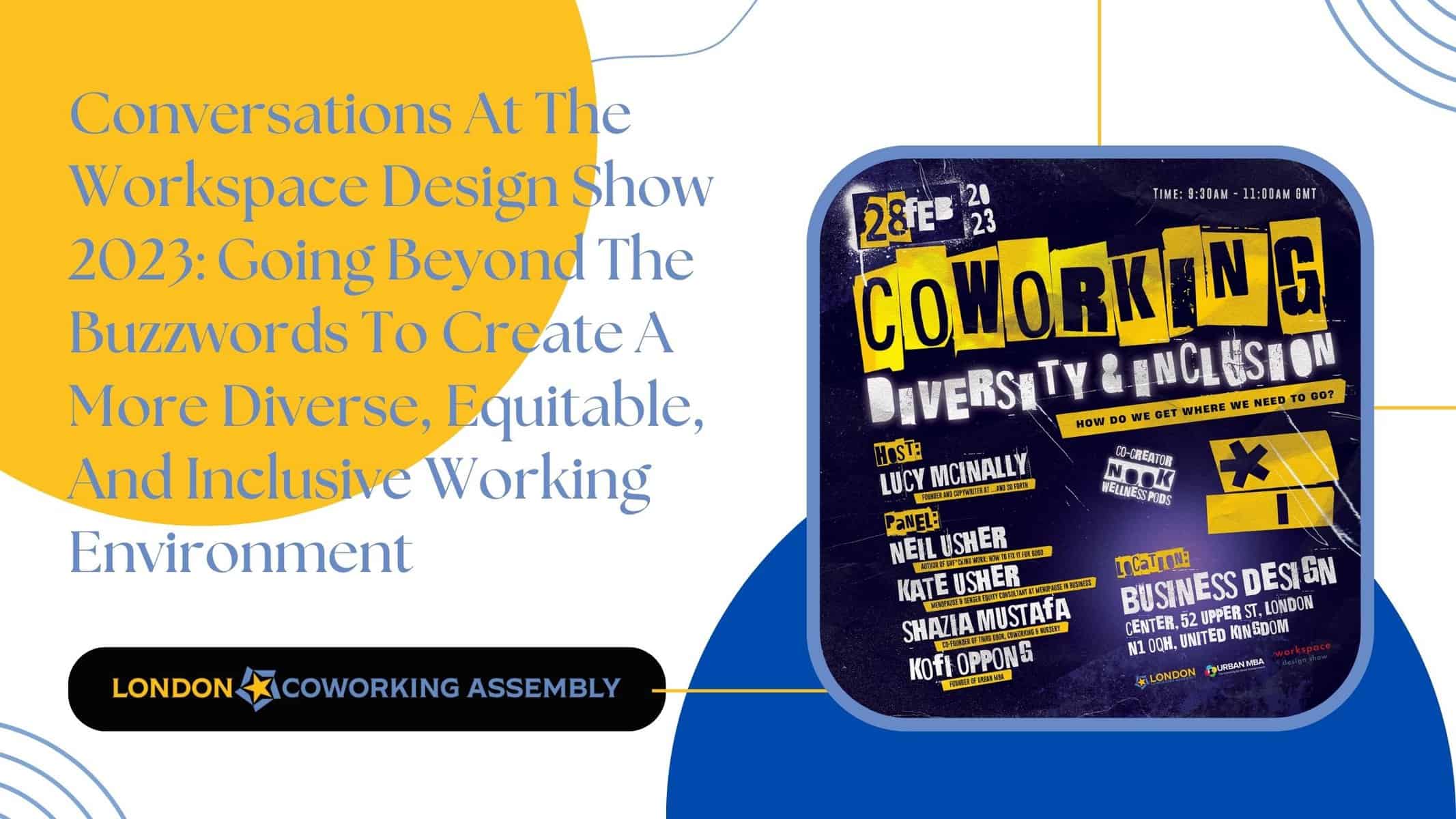Diversity, equity, and inclusion, also known as DEI, are needed to create an empathetic, accepting, and progressive working environment. The workplace, however, has historically been a breeding ground for a culture of toxic masculinity which inhibits some members of marginalised communities, including women, members of the LGBTQ+ community, people of colour, neurodiverse, and people with disabilities, amongst others, from thriving in the workplace or in their professional careers.
As part of the Workspace Design Show 2023 – an event bringing together the UK workplace interiors community to experience the working spaces of tomorrow – I was honoured to host “Coworking DEI – Beyond the Buzzwords: How do we get where we need to go?”, a panel held at London’s Business Design Centre in February. Hosted by the London Coworking Assembly and supported by UrbanMBA, the panel discussion included a stellar lineup of speakers, including:
Shazia Mustafa – the co-founder of Third Door, the UK’s first coworking and flexible nursery hybrid Ofsted registered business. Shazia is the Centre Director for The Granville, an affordable workspace for the South Kilburn Community, the Vice Chair of PiPA (Parents in Performing Arts), a charity making theatre and the arts family-friendly, and part of the Mayor of London’s Workspace Advisory Group.
Kofi Oppong – the founder of UrbanMBA, the university for street entrepreneurs. Kofi has always been at the heart of the urban scene, right from when he worked for JD Sports and Nike in marketing and product management. He’s a self-made business consultant, author, and speaker who strongly believes that lasting change starts with education. His vision is a world where no one gets left behind.
Kate Usher – a coach and change strategist specialising in Menopause, Equality, Diversity, and Inclusion. Kate works with organisations to identify the key barriers to their culture and practice, and builds and implements strategies that foster an equitable work environment. Kate is the author of “Your Second Phase: Reclaiming Work and Relationships During and After Menopause”. She works to increase awareness of menopause and its pivotal impact on equality across the workforce, as well as develops strategies for organisations to retain female talent.

The panel came together to discuss the lack of DEI in the coworking industry. We touched on the panel’s personal experiences and thoughts on how the sector can go beyond the buzzwords, put the “co” back into coworking, and become more diverse, equitable, and inclusive to all communities.
DEI is not just a tickbox
Equity isn’t the same as equality. To explore the impact of DEI in the workplace, it’s important to educate ourselves on the differences between equality – to treat everyone the same regardless of individual differences – and equity – to recognise and address those differences by equipping individuals with the resources and support they require to have equal access to opportunities. In other words, equality is giving everyone the same thing, whilst equity is giving people what they need to be successful, which will differ from person to person.
The conversation surrounding equity and equality also needs addressing in working cultures. Many businesses have a diverse board or leadership team, but they’re doing this to tick a box; as Kate notes, leaders “only offer advice, they do not control the culture or running of the organisation”.
If they cannot empathise with and be able to address the challenges that people are currently facing, such as immigration or cost of living, for example, how can they make a positive impact in the wider community? Kofi says that a business might appear inclusive on the surface but in order to make a real change, leaders need to go into communities and speak to the people.
In order to understand differing needs, Shazia recommends that an understanding of intersectionality is necessary. This describes how different social and political identities intersect and interact with each other to create unique and complex experiences of privilege and oppression.
Intersectionality “is a metaphor for understanding the ways that multiple forms of inequality or disadvantage sometimes compound themselves and create obstacles that often are not understood among conventional ways of thinking” – Kimberlé Williams Crenshaw (critical legal race scholar who developed the concept of intersectionality in the 1980s).
So, why is there a lack of DEI in workplace cultures? Kate explains how there is a pattern that workplaces have established and “if you’re not part of the pale, male, stale group…you need to work harder to fight your corner”.
But isn’t coworking a trendsetter for inclusivity?
The coworking industry is often perceived as forward-thinking, with spaces and memberships created by individuals who celebrate diversity and practice inclusivity to differentiate coworking from traditionally homogenised corporate cultures. In her position on the Mayor of London board, Shazia visits many coworking spaces.
In her opinion, these spaces are all targeting the same kind of people – the same businesses and the same freelancers. Their diversity extends to celebrating Black History Month, or International Women’s Day, but Shazia says, “You need to do these things all throughout the year”.
Kofi agrees that there is still work to be done in the coworking industry. He explains that when people walk into a workspace and can’t see people who look similar to them, they will simply walk out. It was the same for him when he first got into sport; he identified an opportunity by seeing other black people getting into it. But in coworking, Kofi doesn’t see enough of this. “We might have to ringfence some coworking spaces with the right people, for the right people. Can we get some coworking spaces that are black-owned?”
In terms of DEI, the coworking sector isn’t quite a trailblazer yet. But this doesn’t discount the efforts made by individual coworking spaces, one of which Shazia started herself in 2008 before the concept of coworking was established.
Third Door was the UK’s first coworking and flexible nursery hybrid Ofsted registered business. “I remember one mum”, Shazia recounts, “who came through the door, we were based in Wandsworth and she’d made the trek from West London. She posted on social media that she used our space because as a black mum, it was a safe place for her and her daughter to come. Just by default, the things I was putting in place, without really thinking and it was never a conscious effort, was part of that”.
Shazia is now the Centre Director for The Granville, an affordable workspace for the diverse South Kilburn Community. This work involves understanding the different communities that reside there. She says, “DEI is so important…[but] how do you design that?”
Designing an inclusive coworking environment
Individuals have specific needs that depend on a lot of different factors. It’s therefore quite challenging to design an inclusive environment for all, but that doesn’t make it impossible. For instance, women require more toilets. We also feel the cold at lower temperatures than men, and many would generally prefer to work in a warmer environment although Kate says that pregnant and menopausal women sometimes feel comfortable at cooler temperatures. Designing zones that are set to different temperatures might suit these varied needs.
Equally, accessibility is an important topic to cover. Kate explains: “It’s whether you feel that you can get through the front door…It’s about whether you face hurdles before you get to the desk”. If you don’t put yourself into the shoes of another individual with different needs, you won’t be able to acknowledge and understand accessibility.
For example, it wasn’t until Shazia became a mother and started using a pram that she realised how “London is not a very inclusive place”. She imagines that it’s challenging for wheelchair users to move around the city. Our conversation could have extended beyond coworking spaces to talk about the city and public spaces.
Although we didn’t have time to cover such a significant topic, the panel recommended some further reading including Invisible Women: Exposing The Gender Bias Women Face Everyday by Caroline Criado Perez and Feminist City: Claiming Space In The Man-Made World by Leslie Kern. After researching these topics myself, I recently wrote a blog post on A Deep Dive into the British History of Exclusive Spaces for the London Coworking Assembly.
Creating inclusive coworking spaces isn’t limited to designing the physical space. DEI also permeates through workplace cultures. Whether these surround values of inclusivity or not will be determined by how comfortable an individual feels when they’re experiencing that space.
I asked the panel whether the values of DEI should be dictated by an operator, community manager, or by the members themselves. Although a challenging question to get into, Shazia described how in her coworking space, she implemented values of respect and curiosity, and she was driven by the thought that “as a brown woman, I needed to look really professional otherwise no one is going to take me seriously”.
Third Door was extremely well-received by its community, with parents travelling from far and wide to work there. But Shazia “never set up Third Door thinking about diversity, it just became part of my personality that came through”.
Why does DEI in workspaces matter now?
Working with young entrepreneurs setting up their own businesses, Kofi notices that many of them work from their bedrooms because they don’t know that there are local workplaces to go to. Once they discover local coworking spaces, they know that they need them and they use them.
Kofi believes that the conversation around coworking needs to expand into education, to let people know about what the concept of coworking is. This is only part of the necessary steps to create more diverse and inclusive workspaces.
DEI matters now because the young people of today have more choices, Kate explains. They choose where they want to work based on their diversity. If they work for a company that’s not inclusive, they’ll leave and find a job elsewhere. “We have a squeeze on talent, and people are choosing with their feet”. You’re also more likely to get called out if you’re not implementing values of DEI into your workspace.
A diverse workplace drives creativity and agility, GCHQ stated, which are both needed in today’s shock-prone business environment. According to McKinsey, organisations that invest in gender and ethnic diversity outperform those that don’t. As a company leader, business manager, or coworking operator, it’s crucial to have values of DEI in your workplace.
Making sure everyone’s perspective is heard and they feel like a valuable part of the conversation contributes to nurturing a working environment that’s inclusive to all. Kate concludes that “More and more it’s about the things you say. We can do all the big words, but it’s in your micro statement, micro-actions, that tell you whether you are welcome or not”.

